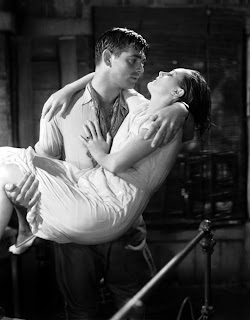Werth: Sorry? Why? Did you not send your condolences to the family of Deanna Durbin?
Wise: While it's sad when anyone with a connection to old Hollywood passes on, I never really understood Durbin's appeal. She was all eyebrow and tremolo to me. But I'm apologizing because I forgot to bake a cake to celebrate Mary Astor's birthday.
Werth: Astor is one of my favorite actresses from the Golden Era. Not as well remembered today as some of her contemporaries, Astor was a cinematic workhorse starring in films from the silent era until her final role in 1964 in Hush...Hush Sweet Charlotte.
Wise: Obviously collateral damage from the Davis/DeHavilland brawl.
Werth: Astor turned in one of her most memorable performances in the 1941 hard-boiled classic, The Maltese Falcon. Based on Dashiell Hammett's popular detective novel, Falcon stars Humphrey Bogart as iconic gumshoe Sam Spade. Spade receives a visit from the lovely Brigid O'Shaughnessy (Astor) who hires him and his partner, Miles Archer (Jerome Cowen), to tail a man who's done her wrong. When Archer turns up with lead in his guts, Spade becomes embroiled in a crime ring in search of a valuable statue.
Wise: If only he had checked Amazon first.
Werth: The film is full of a who's-who of Forties character actors. Sydney Greenstreet is a delight as The Fat Man, a chortling, criminal Buddha, earning himself a Best Supporting Actor nom in his first film. Elisha Cook, Jr. is appropriately twitchy as a young gunsel who is just itching to plug Spade.
Peter Lorre is creepily sinister as Joel Cairo, a lilting-voiced two-timer whose card smells of gardenias, and who practically fellates a cane in Spade's office. Warner Bros. only hinted at this gay character, Hammett's book outright calls him a "queer."
Wise: I wonder if there's an "It Gets Better" video for people who want to marry their walking stick.
Werth: Bogart had finally gotten a star turn the same year in High Sierra after 27 years of making films, and with the popularity of Falcon, he reached superstar status. Of course, one year later he would become a Hollywood legend in a little film called Casablanca. Bogart's detached and world-weary, good guy persona was a winning combination for the actor, and his gruff and tart delivery of the rat-a-tat dialogue shows the intelligence and charm behind his baggy-eyed exterior.
Astor plays with and against her good-girl screen image as a patrician, elegant woman whose every line is a lie, her delivery correctly sounding like a performance. But rather than just playing the duplicity of the role, Astor's eyes capture a genuine desperation that make this role one of her best.
Falcon was John Huston's directorial debut and he made the most of it, earning Academy noms for Best Picture and Best Screenplay, and helping craft the cinematic look that would come to be called film noir.
Wise: Astor plays a smaller, though no less vital role in A Kiss Before Dying (1956) as the mother who inspires Robert Wagner's murderous desires. Wagner plays Bud Corliss, an Army vet and college student who discovers that his rich girlfriend Dorie (Joanne Woodward) is pregnant, but instead of eloping and risking her father's wrath (and disinheritance), he plots to murder her, disguise it as a suicide, and marry her sister Ellen (Virginia Leith) instead. He nearly succeeds, but Ellen, following a few clues and with the help of the hunky nephew (Jeffrey Hunter) of the chief of police, discovers the shocking truth.
Werth: I've got a few shocking truths to show Jeffrey Hunter.
Wise: In just a few short scenes, Astor creates a portrait of a woman whose own frustrated marriage forced her to focus her attentions on nurturing her son, only to realize that her efforts have bred a killer. Astor, who spent much of the 1940s playing wholesome maternal figures, most notably in Meet Me in St. Louis (1944) and Little Women (1949), dials up her performance just enough to make her virtuous screen persona turn slightly off-key. It's all very Freudian, and A Kiss Before Dying fits neatly into a continuum of murderous mamma's boys from the post-war period of Hollywood that culminated with Norman Bates in Psycho (1960).
Werth: Did they smell of gardenias?
Wise: Director Gerd Oswald employs an effective strategy in the making of the film: his characters barely speak above a whisper, creating tension by forcing the audience to the edge of their seats. He also stages long takes with little action, but framed at off-kilter angles, telegraphing both his killer's skewed outlook on life as well as the precarious position of his innocents. (It's hard to believe this is the same guy who put Bunny O'Hare on the screen.)
But Robert Wagner is the real revelation here. To those of us who know him from the latter half of his career playing dashing buffoons in TV series like Hart to Hart or the Austin Powers films, it's a shock to see him slender and beautiful and full of malice.
Werth: Some would say enough malice to shove his wife off a boat.
Wise: Let's leave the Hollywood conspiracy theories for next week's Film Gab.























